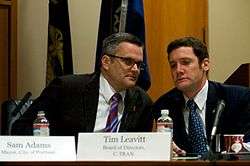Tim Leavitt
| Timothy D. Leavitt | |
|---|---|
|
Leavitt (right) discussing the Columbia River Crossing Project with Portland mayor Sam Adams, circa December 2009 | |
| 57th Mayor of Vancouver, Washington | |
|
Assumed office 2010 | |
| Preceded by | Royce Pollard |
| Personal details | |
| Born |
1971 (age 44–45) Yakima, Washington, U.S. |
| Education | Fort Vancouver High School |
| Alma mater | Washington State University |
Timothy D. Leavitt (born 1971) is an American politician from the state of Washington who is currently the mayor of Vancouver, Washington. He was first elected mayor in 2009 when he defeated 14-year incumbent Royce Pollard
Personal life, education and career
Leavitt was born in Yakima, Washington and has lived in Clark County since 1980. He graduated from Fort Vancouver High School, then attended Clark College and Washington State University, where he received a master's degree in environmental engineering and was a member of Alpha Kappa Lambda fraternity.[1] From 1998 throughout his political career, Leavitt has worked for civil and environmental engineering firm PBS Engineering + Environmental.[2] He has never been married and has no children.[3]
Political career
In January 2003 Leavitt was appointed to the Vancouver City Council to fill a vacancy and was elected to the seat in November of that year, 2003. While on the Council, Leavitt also served on the board of directors of C-TRAN, including acting as its chair for several years.
In January, 2010 he succeeded 14-year mayor Royce Pollard after winning the 2009 election by nine percentage points.[4] Most attribute the upset of Pollard's decade-plus dominance of the city's mayoral politics to an election divided over whether tolling will be used to pay for replacement of the Interstate Bridge,[3] with Leavitt opposing tolls for Vancouver residents.[5]
Shortly after he was elected, Leavitt revealed that the battle against tolls "is not winnable," and changed his stance.[6]
Leavitt was sworn in on January 4, 2010.[7]
In late 2011, there was some speculation that Leavitt would run against Jaime Herrera Beutler for a seat in the House of Representatives representing the 3rd congressional district in the 2012. The speculation came out in August 2011 when he Tweeted "Leavitt for Congress?" However, in November, he released a statement saying, "After much conversation, advice/feedback and deliberation, I've decided now is not the right time for me, for our city council and for our community to pursue the WA 3rd Congressional District seat," however speculation continued that he might run in 2014. Herrera Beutler ended up winning reelection with 60% of the vote.[8][9]
In 2013, Leavitt ran for reelection, opposed by City Councilor Bill Turlay. While Leavitt was endorsed by The Columbian and unions representing city employees, local firefighters, and others, Turlay was endorsed by the Clark County Republican Party.[10] In the November election, Leavitt beat Turlay, 53% to 47%.[11]
See also
References
- ↑ Clark College Foundation. Spring 2010. p. 12. Missing or empty
|title=(help); - ↑ "About Tim". leavitt4mayor.com.
- 1 2 Brettman, Alan (January 4, 2010). "Tim Leavitt, Vancouver's new mayor, takes oath of office tonight". The Oregonian.
- ↑ Vogt, Tom (December 27, 2009). "The Columbian's top stories of 2009". The Columbian.
- ↑ Giegerich, Andy (January 1, 2010). "Vancouver mayor plans business-friendly agenda". Portland Business Journal.
- ↑ Damewood, Andrea (July 20, 2010). "Leavitt assailed for toll position". The Columbian.
- ↑ Brettman, Allan (December 30, 2009). "Vancouver Mayor-elect Tim Leavitt will take office in Monday ceremony". The Oregonian.
- ↑ The Oregonian (November 22, 2011). "Vancouver Mayor Tim Leavitt will not run for Congress in 2012". Oregon Live.
- ↑ Damewood, Andrea (August 11, 2011). "Vancouver mayor weighing run for Congress". The Columbian. Retrieved 31 August 2013.
- ↑ "Mayoral candidates vary on vision", The Columbian, October 13, 2013
- ↑ Middlewood, Erin (November 5, 2013). "Leavitt wins second term as Vancouver mayor". The Columbian. Retrieved 6 January 2014.
